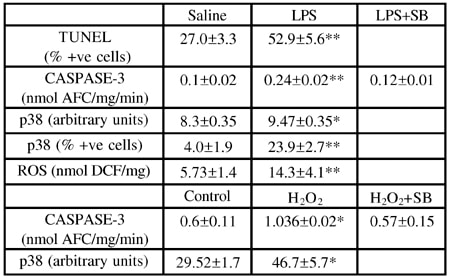Lipopolysaccharide (LPS), a component of the cell wall of Gram-negative bacteria, has been shown to lead to neurodegenerative changes in the hippocampus. This study aims to investigate the signalling events induced by LPS which contribute to these changes.
Male Wistar rats were anaesthetized by intraperitoneal injection of urethane (1.5 g kg-1), injected with SB203580 (50 µM; 5 µl) or saline (5 µl) intracerebroventricularly and 5 min later injected intraperitoneally with LPS (200 µg kg-1) or saline. Three hours later rats were killed humanely by decapitation, hippocampus was dissected and frozen.
LPS increased the number of cells exhibiting fragmented DNA (assessed by TUNEL), which is indicative of degeneration, compared to saline-treated rats (Table 1; n = 5). This was paralleled by p38 activation where densitometric analysis of Western immunoblots confirmed a significant effect of LPS (n = 6). Immunocytochemical analysis of cytospun cells demonstrated an increase in the percentage of cells displaying activated p38 immunoreactivity in rats treated with LPS (n = 5). We also provide evidence of co-localization of activated p38 and caspase-3 in hippocampal cells after LPS treatment. Moreover, the stimulatory effect of LPS on activation of caspase-3, an indicator of cellular degradation, was abolished by pretreatment with the p38 inhibitor SB203580 (n = 6). LPS increased the accumulation of reactive oxygen species (ROS; n = 6) while incubation of tissue with H2O2 (200 µM), which induces the formation of ROS, increased p38 activity (n = 6). In addition, H2O2-induced activation of caspase-3 was abrogated by SB203580 (n = 6).
These data identify an essential role for accumulation of ROS and activation of p38 in mediating the cellular degeneration that occurs in the hippocampus in response to LPS.
This work was funded by Enterprise Ireland.

